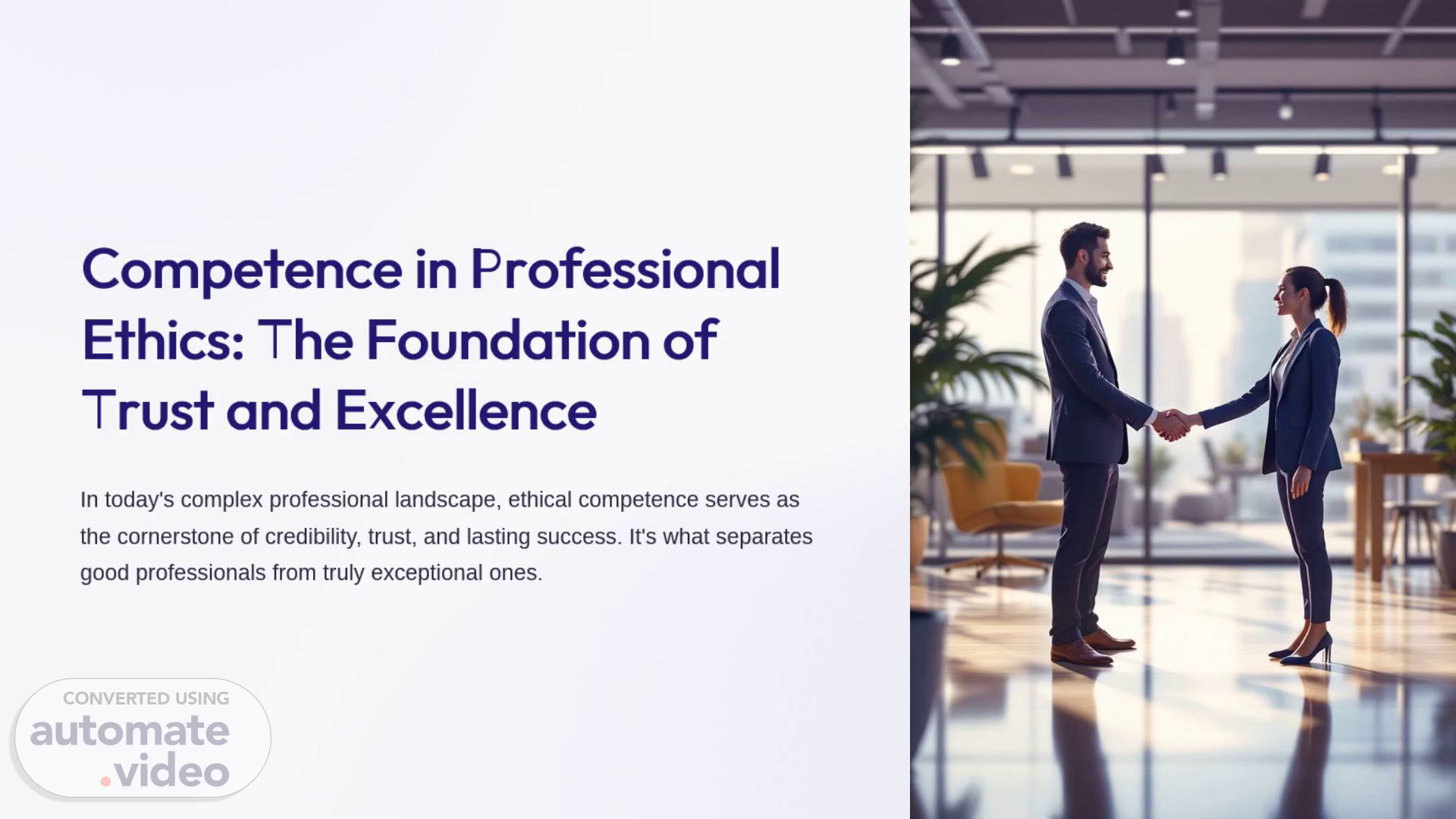
Competence-in-Professional-Ethics-The-Foundation-of-Trust-and-Excellence
Scene 1 (0s)
[Audio] Competence in Professional Ethics: The Foundation of Trust and Excellence In today's complex professional landscape, ethical competence serves as the cornerstone of credibility, trust, and lasting success. It's what separates good professionals from truly exceptional ones..
Scene 2 (18s)
[Audio] What is Competence in Professional Ethics? The Essential Elements Protection Through Practice Competence means possessing the knowledge, skills, and judgment necessary to perform professional duties ethically and effectively. It's the intersection of technical expertise and moral clarity. Ethical competence safeguards human welfare and protects clients from harm by ensuring every decision aligns with both moral principles and professional standards. It creates a shield of trust that benefits individuals, organizations, and society at large. According to the American Bar Association, competence requires thorough preparation, specialized skill, and comprehensive knowledge to serve clients with integrity..
Scene 3 (1m 4s)
[Audio] Core Components of Ethical Competence Sensitivity Objectivity & Flexibility Building trustful relationships through genuine empathy, active listening, and deep respect for diverse perspectives and experiences. Making balanced, unbiased decisions while adapting thoughtfully to complex, nuanced situations that require careful consideration. Reflective Decision-Making Confidentiality & Honesty Continuously evaluating ethical dilemmas, examining outcomes, and learning from experiences to improve future judgment. Maintaining privacy and unwavering truthfulness as non-negotiable pillars that form the bedrock of professional trust..
Scene 4 (1m 49s)
[Audio] Why Ethical Competence Matters: Real-World Impact 79% 8/10 $B Witness Misconduct Face Retaliation Annual Costs Employees globally report witnessing unethical behavior in their organizations U.S. workers experience consequences for reporting ethical violations Lost in business, legal penalties, and damaged reputations from ethical failures The Positive Side of Ethics Organizations with strong ethical cultures experience higher employee retention, enhanced problem-solving capabilities, and significantly increased stakeholder trust. Professional codes of ethics serve as essential guides, helping navigate conflicts of interest, confidentiality concerns, and fairness dilemmas with confidence..
Scene 5 (2m 39s)
[Audio] Developing and Demonstrating Ethical Competence Lifelong Learning Stay current with evolving ethical standards, emerging professional challenges, and new knowledge. Continuous education ensures you remain competent in an ever-changing landscape. Self-Awareness Recognize personal strengths, acknowledge limitations, and avoid the dangers of subtle incompetence. Understanding your boundaries is crucial for ethical practice. Accountability Own your decisions and actions completely. Actively seek constructive feedback, engage in ethical discussions, and take responsibility for outcomes. Clear Communication Articulate ethical reasoning effectively in writing, presentations, and workplace interactions. Transparency in ethical thinking builds trust and understanding..
Scene 6 (3m 30s)
[Audio] The Call to Action: Commit to Ethical Excellence Essential, Not Optional Continuous Growth Ethical competence is fundamental for professional credibility and societal trust. It's what defines true expertise in any field. Embrace lifelong learning, uphold unwavering integrity, and actively foster ethical cultures within your workplace and professional community. Lasting Impact Remember: Competence in ethics protects people, advances your profession, and builds a better, more trustworthy world for everyone. "Ethics is knowing the difference between what you have a right to do and what is right to do." — Potter Stewart.